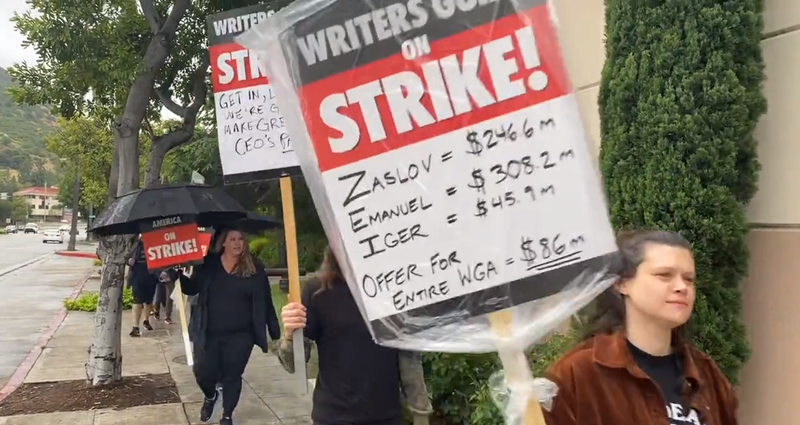
LOS ANGELES (KNX) - As the Writers Guild of America strike enters its fourth day, both sides are settling in for the long haul.
Moody’s Investors Services predicted that the strike could last three months or more, which could seriously impact the credit ratings of entertainment companies. The analytics service says the biggest risk is for struggling theater chains and companies that have suffered losses while expanding their streaming services, like Warner Brothers-Discovery.
Warner Brothers-Discovery held its quarterly earnings call this morning, reporting that its streaming business added more than 1.5 million subscribers in the first quarter and turned a $50 million profit.
CEO David Zaslav told CNBC he was eager to reach a deal where writers feel they’re compensated fairly, but the industry is still debating how to carve up those streaming profits.
“The industry is in the middle of some significant disruption, and people are changing the way they consume content,” Zaslav said. “And so it’s very difficult to figure out, how does that work, what’s the right value for it?”
The WGA proposed that writers should receive viewership-based residuals for streaming content, rewarding programs with a greater viewership. They also asked for improved residuals and script fees for high-budget programs on ad-supported free streaming services.
The studios rejected those proposals with no counter-offer.
Despite the dire predictions from Moody’s, AMC Theatres CEO Adam Aron is optimistic that the strike will end before it impacts the theater chain.
“Its impact will mostly be felt on television programming, because the movies for ‘23 and ‘24 have pretty much been written. In many cases, they’ve already been filmed,” Aron said during a call with investors.
But the writers are prepared to hold out for as long as it takes to reach an acceptable deal.
“I think writers are accustomed to having to make due in between gigs, because most of the jobs these days are short-term,” said Gillian Horvath, who has been working as a writer in Hollywood for more than 30 years.
“When I started out, we had 22-episode seasons, and when you were working on a show, you were working on it for 44 weeks out of the year. You had job stability and you were treated with respect,” Horvath told KNX News. “With the shorter and shorter jobs, people are used to having to stretch their paychecks from one eight-week or 10-week gig across much of the year, and in between, we’re still working. We’re writing free material to try and line up that next job.”
Studios and streaming services may have stockpiles of content to tide them over in the short-term, but as the strike stretches on, they’ll need fresh content to keep their subscribers around, Horvath said.
“I think we’ve seen it over the last few years, that as an unknown streamer comes up with a show that people are excited to see, like when The Handmaid’s Tale came out it drove subscribers to Hulu, they need those new shows coming in,” she said. “The catalogs are great for maintaining people, but if they want people to join their streaming services, they need big marquee properties, and they need us to create them.”
Production has already been shut down on multiple hit series due to the strike, including Abbott Elementary, Yellowjackets, and Hacks.
Follow KNX News 97.1 FM
Twitter | Facebook | Instagram | TikTok


